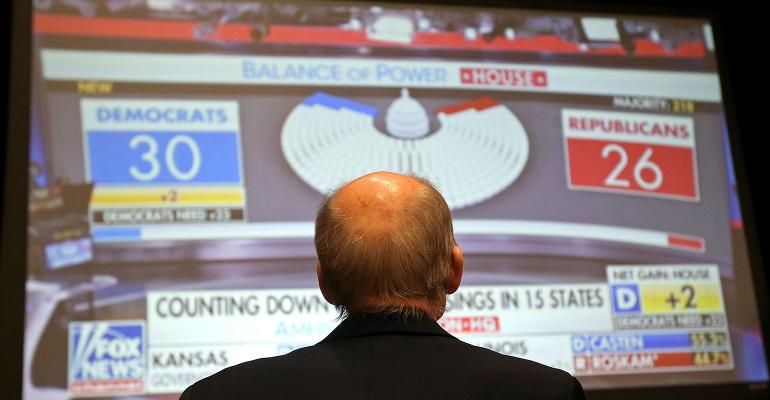Advisors are typically cheering when the U.S. ushers in a divided government; the economy and stocks, after all, tend to do better in gridlock. But this week’s midterm election had advisors cheering for a different reason: the positive effect of creating a balance of power in Washington.
“I believe that our political system is healthier when the two parties share power, so I am happy with the outcome,” said Debra Brennan Tagg, president of Brennan Financial Services in Dallas. “I also believe that both parties govern better when they have to work with the opposing party, so we expect and hope for constructive legislation going forward.”
The result—with the Democrats taking control of the House of Representatives and Republicans holding the Senate—was largely predicted by polls and analysts leading up to Nov. 6. For that reason, most advisors indicated they weren’t surprised by the result, and they don’t expect the markets to be surprised either.
“While markets have historically struggled in the third year of a first term of a president, this may not apply uniformly in 2019,” said Oliver Pursche, vice chairman and chief market strategist at Bruderman Asset Management in New York. “The added checks and balances to President Trump’s agenda, in particular regarding spending and tax cuts, could be interpreted very positively by market participants. Efforts to reduce the deficit from its expected 5 percent of 2019 GDP level could play out well for equities and fixed income.”
“As far as investible markets are concerned, the rather unsurprising outcome may well have proved among the better possible,” said Mark Mowrey, chief investment officer at Statera Asset Management in Irvine, Calif. “Just as we believe balancing potential risk and reward in investing can lead to better outcomes, we think a balanced government may find similarly more broadly fruitful results.”
Some advisors, to be sure, were not happy with the result of a divided government.
“My clients—like any other American—would benefit from a government that works, is not mired in gridlock, and finds solutions to important problems affecting our country,” said Raul Elizalde, president of Path Financial in Sarasota, Fla. Take health care, for example. The U.S. spends 17 percent of GDP in health care while the average OECD country spends 10 percent. The difference—7 percent of GDP—amounts to more than $1 trillion per year. Imagine how much could be accomplished if we could free that much. But the chance of tackling important issues like health care is slim and unchanged after this election.”
One area that could be most impacted by a more partisan government is the country’s fiscal problem, Elizalde said.
“President Trump and the Republican House have doused the economy with fiscal largesse that is very likely to result in a debt crisis in the medium term,” he said. “Since the House controls the purse, the Democrats now face the unenviable task to steer the country on a more fiscally conservative direction. Apart from the obvious negative political consequences, taking away the bowl of sugar that has been so important in fueling stock market gains could affect corporate profits, slow down the economy, and put an end to the second-longest market rally in U.S. history.”
Under that scenario, he argues, financial advice is going to become increasingly important as people look to protect their investments and savings.
Jordan Jacobs, senior vice president and director of wealth management at Estate and Trust Advisors in Northbrook, Ill., said that the biggest financial planning implication is the U.S. national debt and future obligations of entitlement programs. “Neither of those issues were forefront in this midterm election,” he said.
Overall, most advisors said the midterm outcome will have little to no impact on their business, and they’re not making changes to clients’ portfolios as a result.
Although a few said they fielded questions from clients leading up to the election, most advisors shy away from talking to their clients about politics.
“I always avoid discussing politics (and religion) with my clients,” said Jonathan D. Torrens, president and chief investment officer at TCM Wealth Advisors in Fairlawn, Ohio. “I feel it is unwise to mix your politics with your portfolio.”
This election was an emotionally and politically charged one, and because of the uncertainty it created, many advisors were glad it’s over.
“I think that this election season and the fever of Trump have been a burden for everyone. I sense people are mostly glad it is over and dreading when the next cycle starts,” said Jeff Davis, founder and senior partner of Falcon Financial Management.





